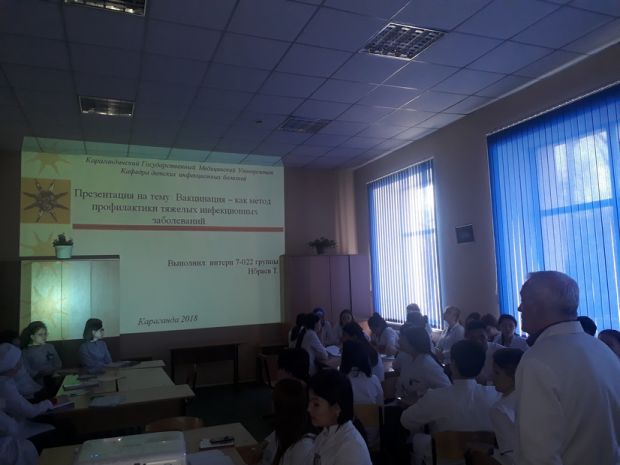Vaccination is an effective and affordable method for the prevention of infectious diseases.

"A healthy person is the most precious work of nature»
Thomas Carlyle
Immunoprophylaxis has made a huge contribution to reducing the incidence of infectious diseases. It is enough to give examples of the elimination of smallpox in the world and polio on 3 continents, almost complete elimination of tuberculosis meningitis, tetanus. The incidence of measles and its complications is reduced to "no", the incidence of mumps, rubella, whooping cough, diphtheria and, accordingly, their complications sharply decreased. WHO concluded that by 2025, diseases such as whooping cough, mumps and diphtheria could be completely eradicated.
On 20th April at the Department of Children's Infectious Diseases there was held a presentation on the topic: "Vaccination is an effective and affordable method of preventing infectious diseases." The event was timed to coincide with world immunization week, which takes place annually from 24th to 30th of April. The goal was to increase the level of vaccination coverage, through the pursuit of a deeper understanding that every child and adult needs to be protected from diseases that can be prevented by means of specific prophylaxis. The conference was attended by 4th year students, 6 and 7 year interns, as well as employees of the department.
The relevance of the work is in the fact that the problem of vaccination is faced by both adults and children at some point in time, and disputes about their effectiveness and safety still persist. In recent years, the world has developed an ambiguous attitude to vaccination. Despite the fact that modern vaccines provide a high level of protection against many diseases, and related deaths and disability, the number of opponents of obligate vaccinations are not reduced. At the same time, most of the arguments against vaccination are based on theories that have nothing to do with the scientific basis or are incorrect and they are deliberately distorted interpretation of scientific literature.
The presentation covered the issues of immunoprophylaxis, vaccination as an integral part of everyone's life.The national vaccination calendar of our country was presented and there were discussed the diseases against which vaccination is carried out (revaccination) and how safe the existing vaccines are today . Ungrounded refusal of parents from vaccination was also covered. The main reasons why parents refuse to vaccinate their child – for religious reasons, because of mistrust of domestic medicine, doubts about the quality of the drug, accompanying documentation and the need for its introduction, little awareness of the population, fear of complications.If parents refuse to vaccinate their child, who is constantly in the team, there is a high probability of mumps (and other infectious diseases). In the future, in the reproductive age, the risk of developing orchitis with irreversible lesions of the genital glands is high. These consequences can lead to infertility. Based on this, it is concluded that vaccine prophylaxis is necessary, because it provides us with a healthy generation. World experience shows that the probability of complications after an infectious disease is thousands of times greater than the risk of complications after vaccination.
At the end of the report, students and interns actively discussed issues of immunoprophylaxis, asked questions of interest to them, to which teachers gave exhaustive and detailed answers. Summing up, the future doctors came to a unanimous decision that vaccination is an important and effective method of preventing infectious diseases.
Y.G. Starikov Associate Professor
T.A.Ibrayev, U.A. Slyamhanova 7-022 groups interns



















































